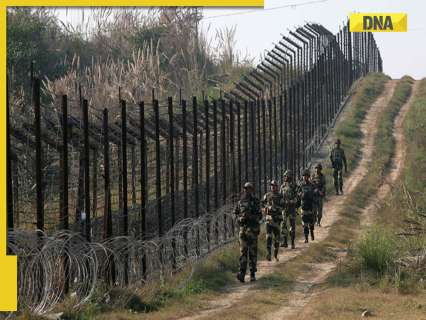Now Reading: How may Pakistan react if India carries out surgical strike post Pahalgam terrorist attack?
-
01
How may Pakistan react if India carries out surgical strike post Pahalgam terrorist attack?
How may Pakistan react if India carries out surgical strike post Pahalgam terrorist attack?

Will Pakistan choose to send its fighters inside India the way it did in 2019 after India had hit LeT bases in Balakote? Or may Islamabad resort to cyberattacks and electronic warfare by crippling the command and control and telecommunication network of the India Air Force or Indian Army?
How may Islamabad react if India carries out surgical strikes inside Pakistan? Will it hit back and use its missile to target the Indian defence establishment? Or will Pakistan choose to send its fighters inside India the way it did in 2019 after India had hit LeT bases in Balakot? Or may Islamabad resort to cyberattacks and electronic warfare by crippling the command and control and telecommunication network of the India Air Force or Indian Army?
Will Pakistan intensify artillery barrage across LoC?
The easiest way of settling its score and retaliating to any Indian action is to intensify artillery barrages or small arms fire along the Line of Control (LoC), targeting Indian military posts, forward bases, or civilian areas in Jammu and Kashmir. Pakistan resorted to this tactic after the 2016 surgical strikes. It is also easier because Islamabad has 155mm artillery systems like M198 howitzers, Turkish-made Panter guns, mortars, and rocket systems for high-volume fire. The Pakistan Army can also go for sniper attacks or anti-tank guided missiles to target Indian bunkers along the LoC.
Pakistan has already taken this path, as it is a low-risk, tit-for-tat option that it has used frequently used. However, Islamabad can not win this game, as India has superior artillery like K9 Vajra, M777 howitzers, and counter-battery capabilities could neutralise Pakistani fire.
Can Islamabad send fighter jets inside India?
Smarting under embarrassment in Balochistan may choose to deploy its JF-17 Thunder jets equipped with precision-guided munitions like the H-4 standoff bomb or REK glide bombs. The Pakistan Air Force can use the US-made F-16 fighter jets with AMRAAM missiles for air superiority or JDAMs for ground strikes. It can also use Mirage-III/V aircraft for delivering precision munitions or cruise missiles like Ra’ad with a range of 250-300 km.
Experts believe Pakistan may not choose this option because India has advanced air defense systems like the Russia-made S-400, Akash and Barak-8 that could intercept Pakistani jets or munitions.
Missile Attack?
Analysts believe Pakistan may use its strong missile batteries to target defence establishments and military infrastructure. Pakistan has subsonic missiles with a range of 450-700 km. It can also use an Air-launched cruise missile with a range of 350 km. Islamabad also has ballistic missiles with ranges of 750-2,500 km and short-range Nasr with a range of 60-70 km. Nasr is a tactical nuclear-capable missile designed for battlefield use primarily as a deterrent.
However, experts believe Pakistan may not opt to fire missiles on India, as it may be misinterpreted as nuclear and trigger massive Indian retaliation. Secondly, India has a much bigger missile arsenal. It may also invite international condemnation if civilian areas are hit.
Drone attack?
The best gamble for Pakistan may be to use its Unmanned Aerial Vehicles or UAVs to hit India. It has Chinese-made CH-4B drones, capable of carrying precision-guided munitions, and indigenously developed Burraq or Shahpar-II drones. Islamabad may be tempted to use this option for asymmetric attacks to avoid confrontation. It is also easier for the Islamic nation because drones could strike Indian military posts, supply lines, or infrastructure near the LoC. However, these drones are vulnerable to Indian anti-drone systems and air defenses. Secondly, these may have limited attack, and Pakistan may want some more dramatic claim to augment its false narrative against India.
More Terrorist Attacks?
Pakistan has always used terrorist organisations as its secondary military assets; it can unleash them once again. It can use groups like Lashkar-e-Taiba (LeT), Jaish-e-Mohammed (JeM), or Hizbul Mujahideen to orchestrate terrorist attacks inside India and target civilian or military sites. It can use these outfits for attacks in Jammu and Kashmir. Similarly, high-profile urban attacks in cities like Delhi, Mumbai, or Bengaluru can be carried out. However, Pakistan has to think twice before coming to this decision, as such attacks could invite international condemnation. It can come under the scanner of the Financial Action Task Force and attract sanctions.























